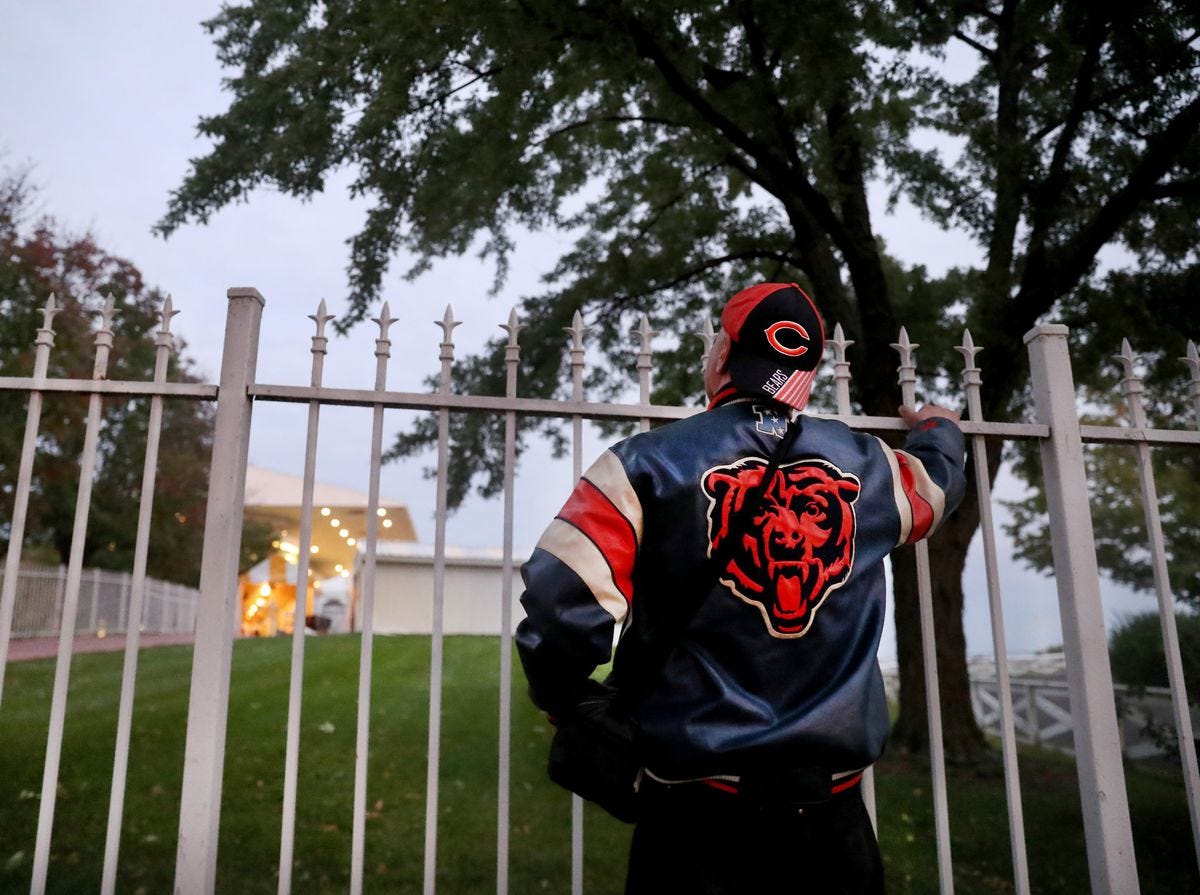THE ILLINOIZE: Thursday Free for All
September 30, 2021
Good morning.
The quarterly campaign finance deadline is tomorrow night at midnight, so you’re seeing some interesting filings pile up as candidates and committees try to gather up cash before the end of the quarter.
GOP Gubernatorial candidate Sen. Darren Bailey (R-Xenia), who is considered the frontrunner at this point, reported $158,000 in large donations yesterday. It included $100,000 from businessman and auto racing owner Gerald Forsythe of Marshall. For a guy who has been struggling raising big cash, this is a big get for Bailey.
Businessman Gary Rabine had a $60,000 day earlier this month and former Sen. Paul Schimpf has lagged behind in large donations. Downstate venture capitalist Jesse Sullivan has raised about $10,000 since the $11 million he raised in his first couple of days in the race.
Governor Pritzker was still sitting on around $32 million this summer. Full reports are due October 15.
If you enjoy what you’re seeing in our updates, we hope you’ll become a paid subscriber. You’ll get two subscriber-only newsletters each week as well as breaking news as it pops up.
It’s just $7.99 per month or $75 for the year, which probably boils down to about .000000025 cents per word each week. (I’m not a math guy.)
Subscribe here:
As always, reach out with questions or comments at patrick@theillinoize.com.
Let’s get to it.
YOUR THURSDAY FREE FOR ALL
(note: we’re not responsible for paywalls and restrictions from other news outlets)
Chicago Bears sign a $197.2M purchase agreement for Arlington Heights racetrack land — taking the next step in a potential move from Soldier Field (Chicago Tribune)
The Chicago Bears have signed a purchase agreement for Arlington International Racecourse, a move that takes the team a step closer toward securing property for a new stadium and leaving their longtime home at Soldier Field.
Bears President and CEO Ted Phillips said in a statement Wednesday morning that finalizing the agreement was the “critical next step in continuing our exploration of the property and its potential.” Churchill Downs announced the sale price was $197.2 million and said it anticipated closing the sale in late 2022 or early 2023.
Soldier Field, which is owned by the Chicago Park District, holds 61,500 fans, the smallest capacity in the NFL. The Bears also would be able to develop the 326-acre land around the stadium with shopping, dining and entertainment.
The purchase agreement ratchets up pressure on Chicago Mayor Lori Lightfoot, who in June mocked the team’s interest in Arlington by tweeting that they should “focus on putting a winning team on the field, beating the Packers finally and being relevant past October.”
Lightfoot said Chicago at the moment is not getting the best it can out of the venue. The stands are empty six months of the year, she said.
As that exploration continues, questions loom as to how the stadium would be funded. When Soldier Field was last renovated, taxpayers covered $432 million, a number that will grow when debt and interest are paid off.
But building their own stadium and entertainment complex also would bring in new revenue streams. The Bears are playing at two of the NFL’s newest stadiums this season — the Los Angeles Rams’ and Chargers’ SoFi Stadium and the Las Vegas Raiders’ Allegiant Stadium — where they can get a closer look at what their future could hold.
If this were just a regular city sports team issue (like the Cubs, my preferred baseball team), it wouldn’t be the kind of story we write about here. But the status of Soldier Field and any new potential stadium likely has a gigantic potential impact on public policy.
The state sold about $300 million in bonds for the place known to some as Soldiers Field in 2003, and because of interest, etc, not much of it has been paid back 20 years later. The bonds are being financed by additional hotel/motel tax and, I believe, some increased food & beverage taxes in Chicago.
Obviously, losing the Bears downtown not only hurts the downtown economy, but you can’t expect the same sort of revenue uptick in Arlington Heights, Schaumburg, Palatine, Rolling Meadows, etc. to pick up the slack.
I’m getting the sense there won’t be a lot of interest in the legislature for a publicly financed stadium and the city isn’t in a great position to do so. And it doesn’t seem like the McCaskey family has the $2 billion or more it would take to finance the project privately.
In the end, this will all come down to money. (Doesn’t it always?)
Related: What are the costs if the Bears bail on Chicago for Arlington Heights? (Chicago Tribune)
Lightfoot prepared to move on at Soldier Field — with or without the Bears (Chicago Sun-Times)
The Bears' long road to the suburbs and back—again and again (Crain’s Chicago Business)
Bears stadium talk excites Arlington Heights business owners, residents (Daily Herald)
Springfield teacher placed on unpaid leave after defying COVID-19 vaccination card or testing mandate (State Journal-Register)
A Southeast High School business teacher has gone public in defying Springfield School District 186's efforts to carry out Gov. JB Pritzker's mandate that school personnel get vaccinated against COVID-19 or tested weekly.
Kadence Koen, a teacher with the district for the last 12 years, was placed on unpaid leave Monday.
Koen had a disciplinary hearing with District 186 personnel Monday afternoon.
Koen said she did not produce a vaccination card for the school nor did she submit to testing there last week.
Koen cited the Illinois Health Care Right of Conscience Act and federal civil rights laws in times of pandemics as her reasons for not complying.
Some have used the Health Care Right of Conscience Act as protection from government and businesses inquiring into or mandating any health care issues.
"What brought me to this decision is that I'm a big fan of liberties and freedom in the country and personal rights," Koen said Monday. "When my employer attempted to overstep my personal rights -- my body, my choice -- I came to the decision I had to stand up to this."
This isn’t about personal rights, morality, or health. This is all about making a statement. All she had to do to continue to work is provide a negative COVID-19 test. I won’t be shedding a tear when she gets fired.
Related: Vermilion County is 35% the size of neighboring Champaign County. It now has more COVID-19 deaths. (Champaign News-Gazette)
Winnebago County COVID-19 vaccine tracker: 48% of people fully vaccinated (Rockford Register Star)
Urbana hospital heads: Reason for pandemic optimism (Champaign News-Gazette)
Report details community colleges’ impact on economy, earnings (Capitol News Illinois)
Lazaro Lopez, chair of the Illinois Community College Board, said at a news conference unveiling the study that it proves what an economic force the state’s community college system is.
“As the largest workforce training provider in Illinois, community colleges create an educated and skilled workforce that addresses current and future needs of many critical industries throughout our state,” he said. “And through this work, community colleges provide a substantial economic benefit for the state and local communities where they reside.”
An investment in a completed associate degree is worth $238,000, according to the report, meaning someone completing a degree can expect to earn that much more over 40 years than if they did not.
“The internal rate of return on their investment is 26.8 percent,” according to the study. “In other words, if a student put $33,368 in an investment that returned 40 annual payments equivalent to the earnings gains from an associate degree, they would earn interest at a rate of 26.9 percent.”
That’s factoring in an assumed cost of $31,883 for the degree, including tuition and other expenses as well as “opportunity” cost, which includes time spent at school instead of work.
Brian Richard, one of the study’s authors from NIU’s Center for Governmental Studies, said the report is based on actual earnings of graduates, rather than just national averages.
“Something unique about this is we attached, connected, actual students’ records with actual wage records, so the numbers in this study reflect the reality of what those students experienced in the workforce, not just some estimates based on national averages and things,” he said at the news conference. “The numbers reflect the true experience of those students that have graduated over the past 10 years or so.”
Community colleges remain the best value in Illinois education.
JOIN US










